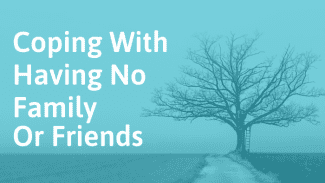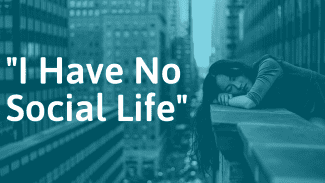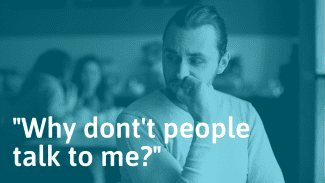People don’t like me. No one likes me in school and no one likes me at work. No one calls me or checks up on me. I always have to reach out to other people first. I think people just put up with me, but that’s it.” – Anna.
Do you feel like nobody likes you? If you have friendships, do you believe they are more obligatory than genuine? Does it seem like you’re always putting in more effort?
Whether your beliefs are true or not, thinking that nobody likes you can feel incredibly lonely and frustrating. Let’s get into what can cause feeling like no one likes you – and explore what you can do to cope.
Sections
- Examine whether no one likes you or if it just feels that way
- Change how you think about others
- Improve your social skills
Examine whether no one likes you or if it just feels that way
Sometimes, our own negative thoughts can distort how we perceive our relationships with others. Learn how to distinguish between actual rejection and your own insecurities.
Be aware that your brain can trick you
Here are some common ways we can misinterpret the world.
- All-or-nothing thinking: You look at things in extremes. The world is in black-and-white. Therefore, everyone likes you, or nobody likes you. Things are perfect, or they are a disaster.
- Jumping to conclusions: You tend to assume how other people think. For example, you may believe someone doesn’t like you, even if you don’t have any real evidence to confirm that belief.
- Emotional reasoning: You confuse your emotions for actual facts. If you feel like no one likes you, you assume this is true.
- Discounting the positive: You automatically disregard positive experiences or moments because they “don’t count” compared to the negative ones. For example, even if you had a great interaction with someone, you assume it was a fluke.
In the next step, I’ll share how to get a more realistic view of the situation. If you want to learn more about cognitive distortions, check out this guide by David Burns.
Avoid thinking about your situation in absolute terms
Most of us “kinda like” or “don’t mind” the majority of people we meet. This might not feel like the resounding social victory you are hoping for, but it’s much better than being hated.
Try to pay attention to the words you use to describe people and events to yourself. Try to avoid absolute words, such as “always” or “everyone”, as well as extreme terms such as “hate”.
When you catch yourself using those words, try not to get angry at yourself or ‘push away’ the feelings that led you to say them. Instead, repeat the phrase with a more accurate word. If possible, include a counterexample to your initial statement as well. For example, if you say to yourself:
“Everyone hates me”
Stop, take a breath, and correct yourself:
“Some people don’t like me very much, but that’s ok because Steve thinks I’m great” or “I have trouble making friends, but I’m learning”
Challenge your assumptions about the situation
If someone snaps at you, you might assume that this means that they don’t like you. Although this might be true, there are other explanations. They might be late for a train and not have time to chat or they might have had a very bad day and just be in a bad mood.
It can be difficult to let go of these negative assumptions. Rather than trying to override them, carry out a thought experiment. When you think that someone doesn’t like you, try to come up with at least two other explanations for their actions, as I did above. Accept that this might be the reason and see how that affects the way you feel and how you choose to respond to them.
You might also check for signs that people send when they don’t like you.
Believe that things can go better
It’s easy to believe that we know how a conversation will go before it starts. This is known as the fortune teller fallacy, and most of us have experienced it at some point. We assume that we know how something will go before it starts. Often, this can lead us to not even trying. If you believe that no-one likes you, your fortune teller fallacy will probably include phrases such as “They’re never going to like me” or “Even if I go, they’re all going to hate me”.
Try to remember that each social encounter is a new opportunity. Give yourself counterexamples when your mind tells you that things “always go wrong”. For example:
“I had a great conversation with Lauren last week”
“Last time I came here things didn’t go great, but I’ve done loads of research and I have a better idea of what to do now”
“It’s much quieter here than last time. That will make it easier for me to make conversation”
“None of these people have any ideas about me. I have a fresh start and I’m gonna make the most of it by smiling and paying attention”
Remind yourself of any new social skills you have been working on or anything you intend to do differently this time. Try to concentrate on the differences between previous social interactions rather than the similarities. This will help you to recognize that things can go differently this time.
Accept that other people like you
If you can’t imagine why people might like spending time with you, it is difficult to believe them when they say that they do. They may then pick up on some of your feelings and get the impression that you don’t trust them.
Building confidence in yourself is a long process, but it can have a huge impact on all areas of your life. If this is a really big problem for you, I do recommend finding yourself a qualified therapist that you trust, as their help can be invaluable. There are lots of things you can do by yourself as well to help you realize what a great friend you can be.
We recommend BetterHelp for online therapy, since they offer unlimited messaging and a weekly session, and are cheaper than going to a therapist's office.
Their plans start at $64 per week. If you use this link, you get 20% off your first month at BetterHelp + a $50 coupon valid for any SocialSelf course: Click here to learn more about BetterHelp.
(To receive your $50 SocialSelf coupon, sign up with our link. Then, email BetterHelp’s order confirmation to us to receive your personal code. You can use this code for any of our courses.)
Think about what you would want in a friend, and try to give that to others. Our article on what makes a true friend can give you some ideas for things to consider. Notice all the times you thought “I would never do those things”. Those are examples of ways in which you’re a good friend. If you found some that did apply to you, that’s ok too. It just shows you where you can improve.
Building up your core confidence can also make a difference. Knowing that you have integrity and are proud of your own actions makes it easier for you to believe that other people might value those as well.
Change how you think about others
While feeling like no one like you can be an irrational thought, it’s also true that we sometimes do things that put people off. In the rest of this guide, I’ll share common behaviors that can make someone less likable. I’ll also share common life situations that can make it harder to make friends.
Focus on the right people
There are over 7.5 billion people on the planet, but we often spend our time focused on just a few of them! The reality is that we won’t mesh with everyone. We may have clashing interests, or our personalities may be wildly different. Sometimes, people just aren’t interested in making friends at the moment.
No matter the reason, focusing your energy on the wrong people can increase feelings of depression or anxiety. How do you know if you’re focused on the wrong people? Consider these warning signs:
- They are overly critical.
- They try to one-up you as if everything is a competition.
- They are always “too busy” to hang out with you.
- They guilt-trip you if you make a mistake or don’t do something the way they prefer.
- They flake on you after confirming plans.
- They encourage you to go against your morals.
- They make mean jokes about you (even if they insist they’re just joking).
- They exclude you from activities or conversations.
- They talk poorly about other people to you (which means they probably complain about you to others).
None of these factors alone indicate that the other person is a bad friend. However, if they have most of these warning signs, it’s worth examining. The right people should make you feel energized, happy, and supported- and not like you’re walking on eggshells.
You might like to go deeper on signs of toxic friendships.
Avoid judging others
We all form judgments about other people all of the time. This is just a part of how the brain works. It takes shortcuts to spare the energy needed for a deeper investigation.[1] Being judgmental is different. Other people will feel that you’re judgemental if you:
- Assume that your assessments of other people are always correct, rather than tentative
- Make strong negative judgments about others based on little information
- Expect others to always follow your moral and social values
- Have little sympathy or understanding of other people’s life experiences
- See difficult ethical dilemmas in black-or-white terms
- Make moral judgments about the person rather than about the behavior
The key ingredients in trying to be less judgmental are empathy and respect.
Demonstrate empathy and respect
When talking about someone else’s decisions, start with the principle of respect. Remind yourself that their actions probably have little to do with you. If you don’t have a good reason to bring up someone else’s actions, find another topic to talk about.
If you are going to talk about things that make you feel judgmental, try to start by acknowledging the difficulties the other person faces that you don’t.
Saying “My neighbors drive me crazy letting their dog bark all the time” sounds a little bit judgemental.
Saying “I recognize it’s hard for them to do lots of dog training because they also have to home-school their children. I do wish they’d try to stop their dog barking all the time though. It drives me crazy” sounds like you’re frustrated but not judgemental.
Remember that being judgmental makes the people you’re talking to worry that they will also be judged if they don’t live up to your standards.
Take the initiative in your friendships
You know that friendships require a mutual take-and-give. But how do you put more effort into your existing ones?
Take the initiative to set plans: Be direct when you want to hang out with someone. Often, people are vague and throw out statements like, we should hang out! However, by making concrete plans, you give people an actual opportunity to accept your offer.
- Do you want to get coffee with me next week? I’m free on Tuesday.
- I’ll be studying tomorrow night. Do you want to join me? I can order a pizza.
- It’s cool that we go to the same gym! I’ll be there on Weds. Wanna meet up?
If they don’t answer, don’t push it. Offer another opportunity in a few weeks. If they still don’t answer, that may be a sign they aren’t interested in the friendship. While that can hurt, at least you know, and you can consider moving on.
Do kind things for other people: Kindness can be contagious, and doing acts of service helps the people around you. This, in turn, can make you be more likable.[2]
- Buy a stranger a meal or cup of coffee.
- Assist a neighbor to unload their groceries.
- Offer to take a shift for your coworker when they need coverage.
- Help a classmate with their homework.
Reach out and show your support: Support is such an essential component in healthy friendships. Consider these simple scripts if you need help:
- That meeting was rough. How are you doing?
- I saw your Facebook post. I’m so sorry. I’m here if you need anything.
- I can’t believe that happened. Let me know if I can help in any way.
- I’m sorry that you’re going through that situation. Can I drop off some food tonight?
Evaluate if you are experiencing depression
Depression is a mental illness that can severely impact how well you connect with others. If you struggle with depression, you might experience chronic feelings of worthlessness, guilt, shame, and apathy. It’s hard to reach out to others when you feel that way!
It’s not easy to manage depression, but consider the following tips:
- Self-Care: Self-care means honoring your physical and emotional well-being. When we feel depressed, we often neglect ourselves. Unfortunately, this neglect tends to reinforce our depression, which makes us feel worse! Self-care can refer to any activity that makes you feel good. You should schedule at least 10 minutes of self-care each day – no matter how busy you are. Some examples of self-care include taking a walk, writing in a journal, listening to your favorite music, playing outside with your animal.
- Limit or avoid “escape” activities: Many times, people abuse substances like alcohol or drugs to numb their pain. While these may provide temporary relief, they don’t address the root problems.
- Professional Support: Depression is challenging, but it can be treatable. Therapy provides a safe and non-judgmental place for you to discuss your thoughts and feelings. Your therapist can also introduce you to healthy coping skills to manage your symptoms.
- Medication: Antidepressants can help with the chemical imbalances associated with depression. Talk to your doctor or psychiatrist to discuss your best options.[3]
We recommend BetterHelp for online therapy, since they offer unlimited messaging and a weekly session, and are cheaper than going to a therapist's office.
Their plans start at $64 per week. If you use this link, you get 20% off your first month at BetterHelp + a $50 coupon valid for any SocialSelf course: Click here to learn more about BetterHelp.
(To receive your $50 SocialSelf coupon, sign up with our link. Then, email BetterHelp’s order confirmation to us to receive your personal code. You can use this code for any of our courses.)
Be interested in others
Even if you feel like no one likes you, consider asking yourself if you like other people. This question may sound strange, but sometimes we struggle to feel a genuine interest in the people around us. We can even feel that we hate people.
The desire to engage with people doesn’t always come naturally. But if you want to develop an appreciation for others, consider the following tips:
- Ask questions about their life: When asked the right questions, many people enjoy talking about themselves. Need some inspiration? Check out our article on 210 questions to ask friends.
- Pretend you are interested: Although this advice seems crass, it goes along the lines of fake it til you make it. In other words, by feigning desire, you might find yourself sincerely engaged with others.
- Learn more about empathy: Empathy refers to the ability to understand and share the feelings of another person. When you are empathic, other people feel understood and validated. It’s an essential component of any healthy relationship. This article by the New York Times offers several actionable steps for developing more empathy.
Know that it takes time to make friends
If you’re just starting to work on your social skills, remember that growth doesn’t happen automatically. You probably won’t make new friends right away. It can take several months for real change to occur.
So, don’t disregard the importance of baby steps. Keep working on building your social skills. Commit to the practice every day- even when it feels challenging or discouraging. Eventually, you will notice a difference.
Improve your social skills
As well as your thought patterns driving people away, you may have some behaviors that make it more difficult for others to enjoy spending time with you. There is no judgment associated with these behaviors. Many of us do these things from time to time. The important thing is to make progress.
Also see our main guide on how to improve your social skills.
Be positive in your conversations
If you’re constantly negative, people will pull away. We want to feel excited and inspired by the people in our lives. If you’re pessimistic, others may deem you as a helpless victim, which can be unattractive.
Here are some tips to stop complaining:
- Know your triggers: Do you complain more around certain people? In various settings? When you’re feeling a particular emotion? Consider when you tend to complain most often. By recognizing these triggers, you can develop an insight to change the pattern.
- Stop yourself when you complain: Use a hair tie and flick it around your wrist when you catch yourself complaining. At first, you may be reaching for your wrist often! However, you’ll become more aware of your tendencies, which can inspire change.
- Identify two things you feel grateful for in that moment: Every time you catch yourself complaining, reflect on two positive parts of your life. It doesn’t matter how big or small they are. Just get in the habit of counteracting negative thoughts with more positive ones.
Listen without interrupting
Many of us don’t recognize when we interrupt others. Interrupting usually isn’t malicious – we often just get excited and want to share our opinion. Sometimes, we just feel an intense urge to contribute, because we feel afraid we won’t have the opportunity to talk.
However, constantly interrupting an easy way to irritate people, as it can make them feel underappreciated or disrespected.
If you struggle with interrupting others, consider the following tips:
- Take a deep breath before you decide to talk (this can help you focus on pausing).
- Literally bite your tongue as a reminder to stay quiet.
- Repeat the mantra, “There is enough time for me to talk.”
- Commit to improving active listening. You might like some tips on how to become a better listener
Find hobbies that suit you
Hobbies are an important part of self-esteem and overall happiness. They also make for excellent opportunities to connect with other people. You may find like-minded individuals who also share the same interests as you do.[4]
If you need help finding a hobby, consider trying these steps:
- Refer to a list of hobbies: Read this article with several social hobbies ideas.
- Narrow down your choices: Select 5-10 hobbies that seem most interesting to you.
- Narrow to the top 2-3 you can try NOW: Choose a hobby that seems realistic and has a “low-entry” point, which means that it doesn’t require excess upfront costs or time commitments to get started.
- Write down your intentions: Identify exactly how you plan to engage in that hobby (i.e., if you want to start gardening, you may watch a YouTube tutorial about which plants to start growing. If you want to learn to cook, you will practice two recipes this week).
- Assess your level of satisfaction after 10+ hours of engaging in the hobby: Give yourself at least 10 hours in engaging in each hobby before dumping it for something else. Keep in mind that the beginning can feel rough because you’re learning a new skill.
Refer back to your list if needed. It’s okay if you have one hobby that you like devoting all your free time toward. It’s also okay if you have a dozen hobbies you dabble in whenever you have the chance. But you need to have something that keeps you excited and motivated and growing. Keep trying new things until you find one that clicks.
Avoid oversharing
Oversharing can be off-putting, as it may make other people feel awkward or uncomfortable. To be likable, you want to balance sharing things about yourself without it seeming like you lack boundaries.
To avoid oversharing, be mindful of your language. Aim to shift into using the words “you” or “they” more frequently than “I” or “me.”
Try to match the emotional content of what you’re sharing with what they are sharing with you. This can help your conversation to feel balanced.
There are several topics that will often make others uncomfortable, particularly if you don’t know them well. These include
- Details of your medical or health experiences
- Details about your personal finances
- Strong political views, particularly if those aren’t shared
- ‘Hot-button’ issues such as abortion or criminal justice reform – mainly if you are in a casual setting
- Information about your dating history
It’s not that you can’t ever talk about these topics, but they might be better avoided early in a friendship. If you are worried about running out of things to say, we have an article devoted to how to keep a conversation going.
Consider this: If that person told ten other people what you just told them, how would you feel? If you would feel extremely uncomfortable, it’s probably a sign you’re oversharing.
Spend time being social
Everyone needs to understand social skills. For some people, these skills come more naturally. However, if you’re shy or introverted or anxious, they can feel much more challenging.
There are several ways to be more social. Start by joining clubs or groups that interest you. Volunteer for community projects or take a class to meet new people with similar interests. The more you expose yourself to different social settings, the more likely you are to come across people who like you!
See our guide on what to do if people don’t like you because you are quiet.
Use polite language
Even those of us who are happy to use somewhat colorful language can find it uncomfortable in certain situations or around people we don’t know well. When you’re getting to know new people, try to avoid cursing or using profanity.
Changing how you express yourself can feel inauthentic as if you are hiding a part of yourself to get others to like you. This isn’t the case. Try to remember that you’re not trying to trick others into liking you. You’re demonstrating that you understand social rules and that you are happy to do things to make others feel comfortable. This builds trust and gives people time to get to know you properly.
Respect other’s personal space
Everyone has their own degree of personal space that they require to feel comfortable. People we know and like are allowed further into our space before we feel uncomfortable.[5] If you find that others are regularly moving away from you, you might just have a lower need for personal space than others.
These are the average comfort levels of personal space in the US:[6]
- Approximately 1-1/2 feet to 3 feet (50-100cm) for good friends and family members.
- Approximately 3 feet to 10 feet (1m to 3m) for casual acquaintances and coworkers.
- More than 4 feet (120 cm) for strangers.
Once you know people well, this can be an asset, as physical contact and closeness are important in building and maintaining deep relationships. With people you don’t know well, however, being overly physical can give the impression that you don’t respect other people’s boundaries.
Try to let others set the distance between you during conversations. Where possible, avoid backing someone into a corner or standing between them and the exit. If you’re particularly tall or broad, you may find that people are more comfortable having conversations when you’re both sitting down.
If you’re naturally quite a physical person, trying to keep your distance can feel isolating. As someone who is naturally ‘huggy’, I completely understand. It can feel like you are being asked to change something fundamental about yourself. Try to remember that this isn’t the case. You’re giving other people the space that they need to feel comfortable. Respecting other people’s boundaries is one way that you can demonstrate that you’re kind and trustworthy.
Match the volume of your voice to the situation
Loud voices can be a sign of someone being excited and enthused, but it can make socializing with you more difficult. Spending time with someone who is loud can make people tired or intimidated.
Part of the volume of your voice is the result of your personal body structure but most of it seems to come from your upbringing and personality.[7] The good news is that this means you are able to change it.
Try to work out when you’re speaking too loudly. It might be that you only speak too loudly in particularly stressful situations, for example. This might make it easier to change.
Consider getting a hearing test, as poor hearing often leads people to speak too loudly. If you have someone you trust, try asking them to let you know when you’re speaking too loudly. If not, you can ask the person you’re talking to. It does take a little bit of confidence, but saying “I’m sorry. Am I speaking a bit too loudly?” makes it easier for the other person to tell you how you come across. This doesn’t just give you valuable information. It also shows the other person that you care about how you come across and how much they enjoy the conversation. They won’t mind your loud voice as much if they know that you’re trying.
Speaking more quietly will take practice. Don’t expect yourself to get it straight away. Practice speaking aloud to yourself when you’re alone to become used to speaking at a quieter volume. If you worry that other people won’t listen to you if you speak more quietly, try our tips on how to be included in group conversations without needing to raise your voice.
Accept that some friendships don’t work
Friendships aren’t always permanent. Life circumstances change, and people evolve, and friendships naturally ebb and flow.
Sometimes, we try to hold onto friendships that no longer serve us. We often do this because we want to recreate the way things used to be.
Allow yourself to feel sad or angry or hurt. But try to remember that it’s normal for some friendships to fade out. You might also like to look at these tips on how to cope when friends distance themselves from you.









My ideas, thoughts and feelings are nobody’s business but my own. As such I don’t share them with anyone because my perspective is usually different from those I hear around me. When asked for my opinion I remain silent or advise that I decline to comment. I have no way of knowing that those trying to engage with me will not seek to do me harm if I do not share their views. The only way to protect me and my property is to stay as invisible as possible because in the lawless garbage society that America has become, one cannot trust anyone (individuals or authorities) to respect differences.